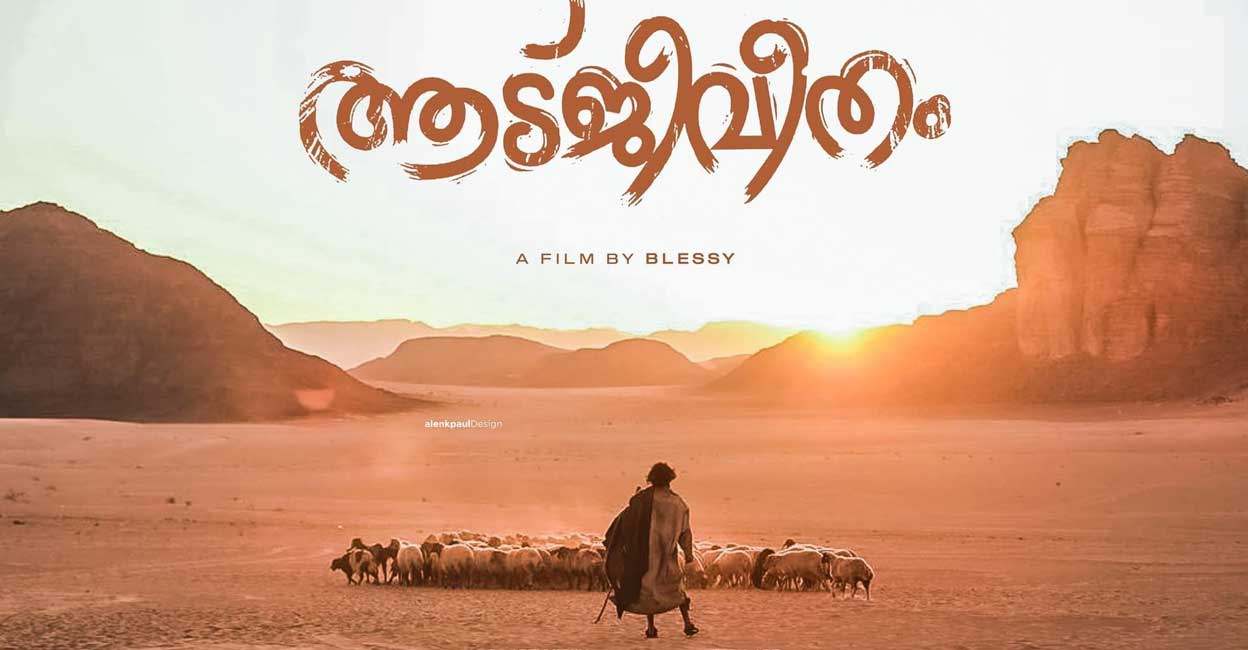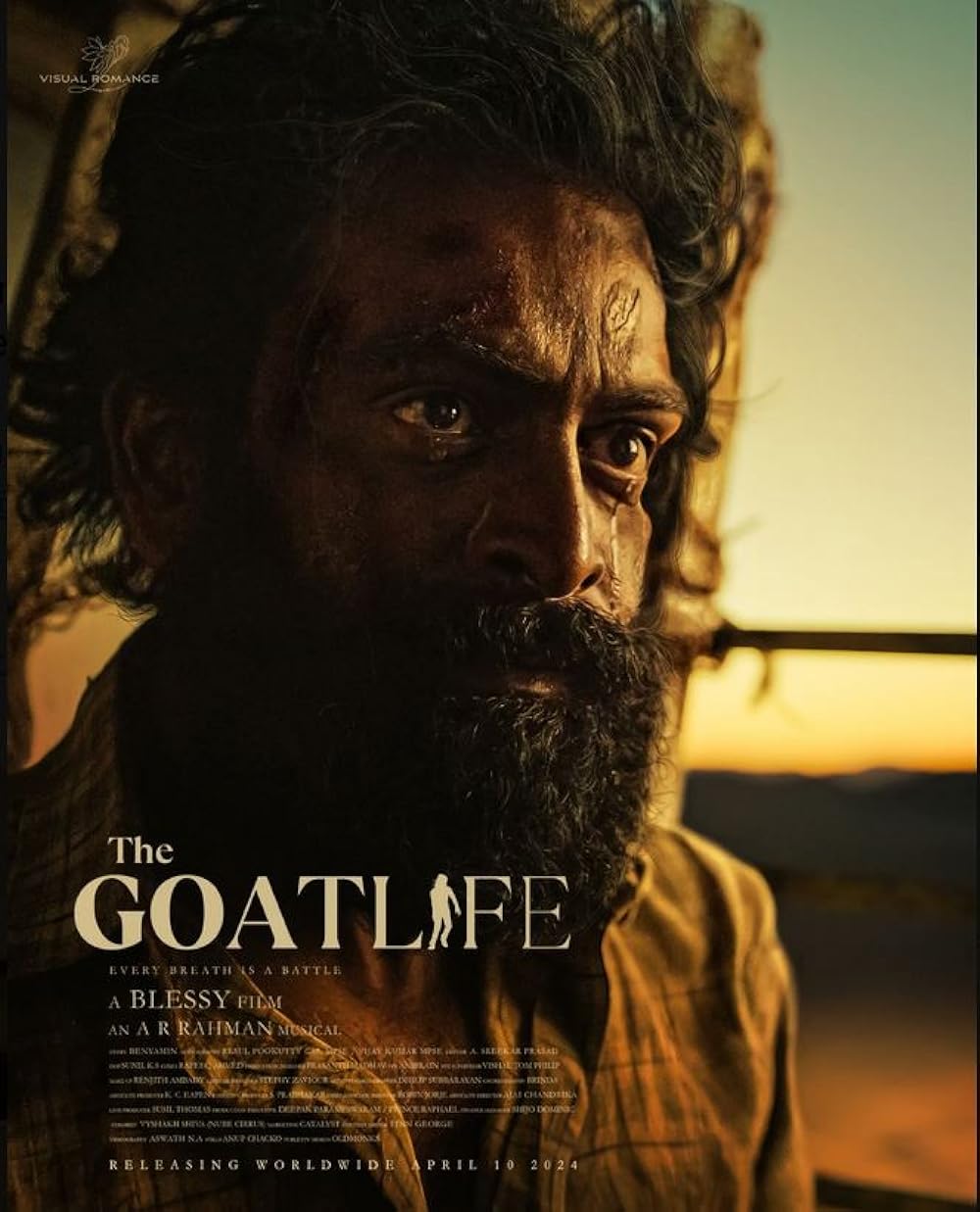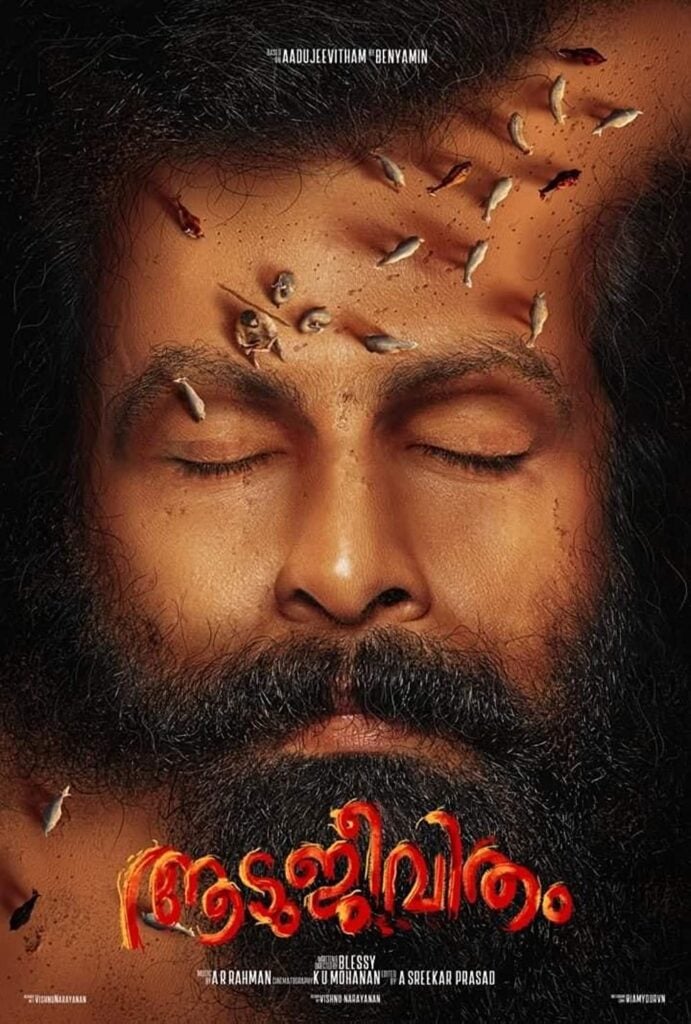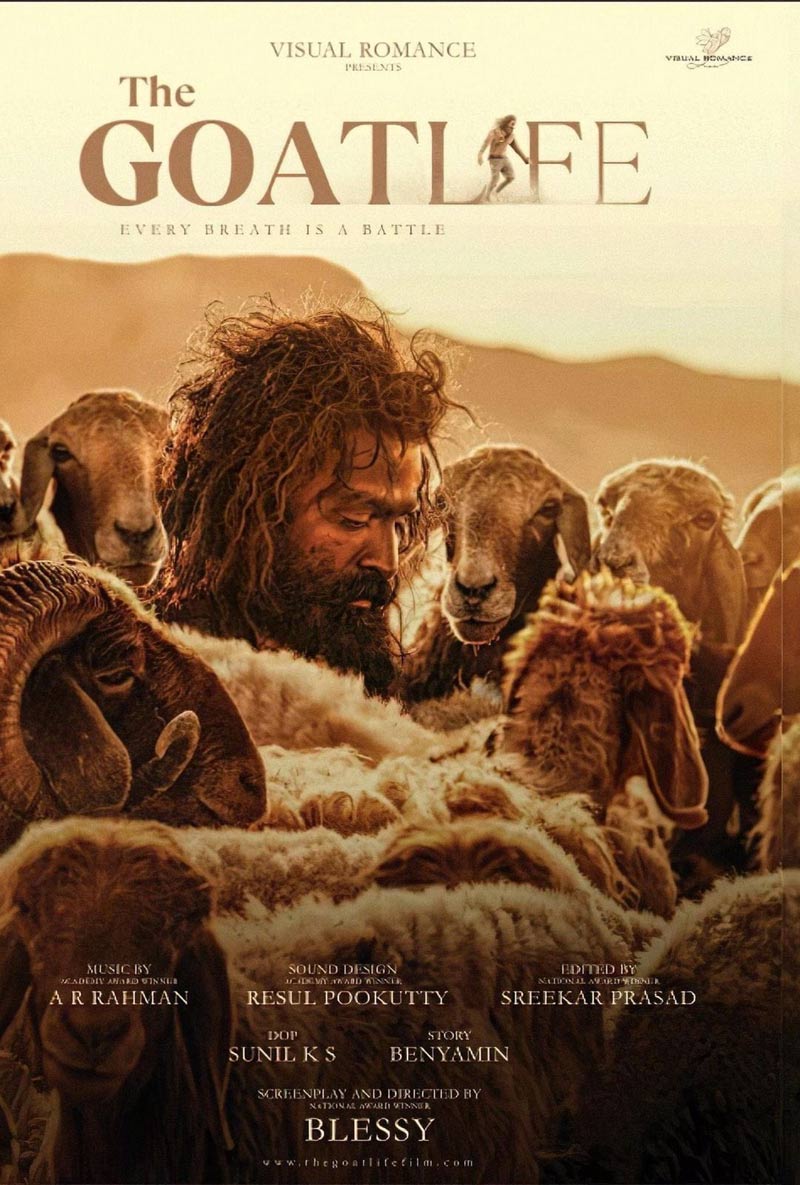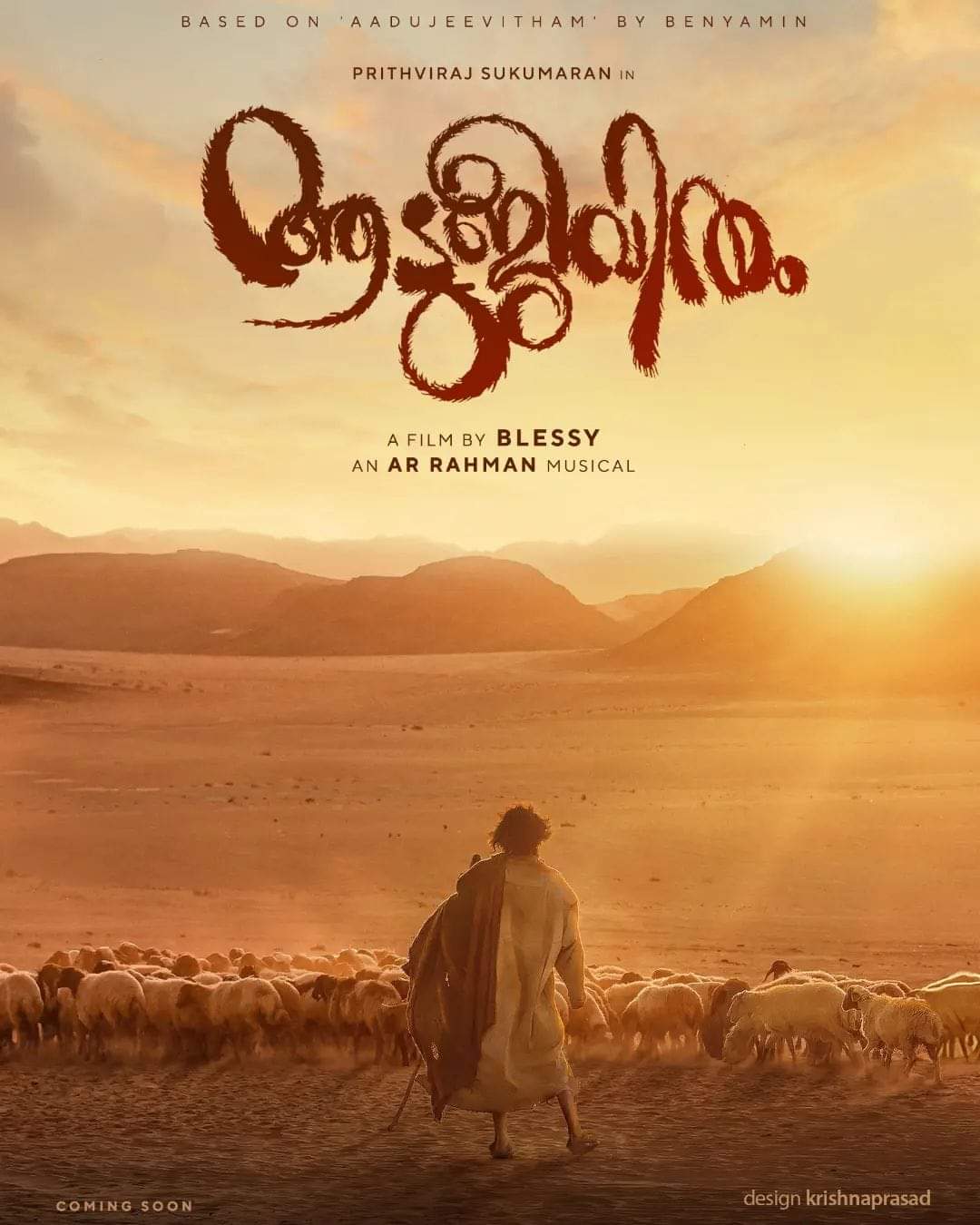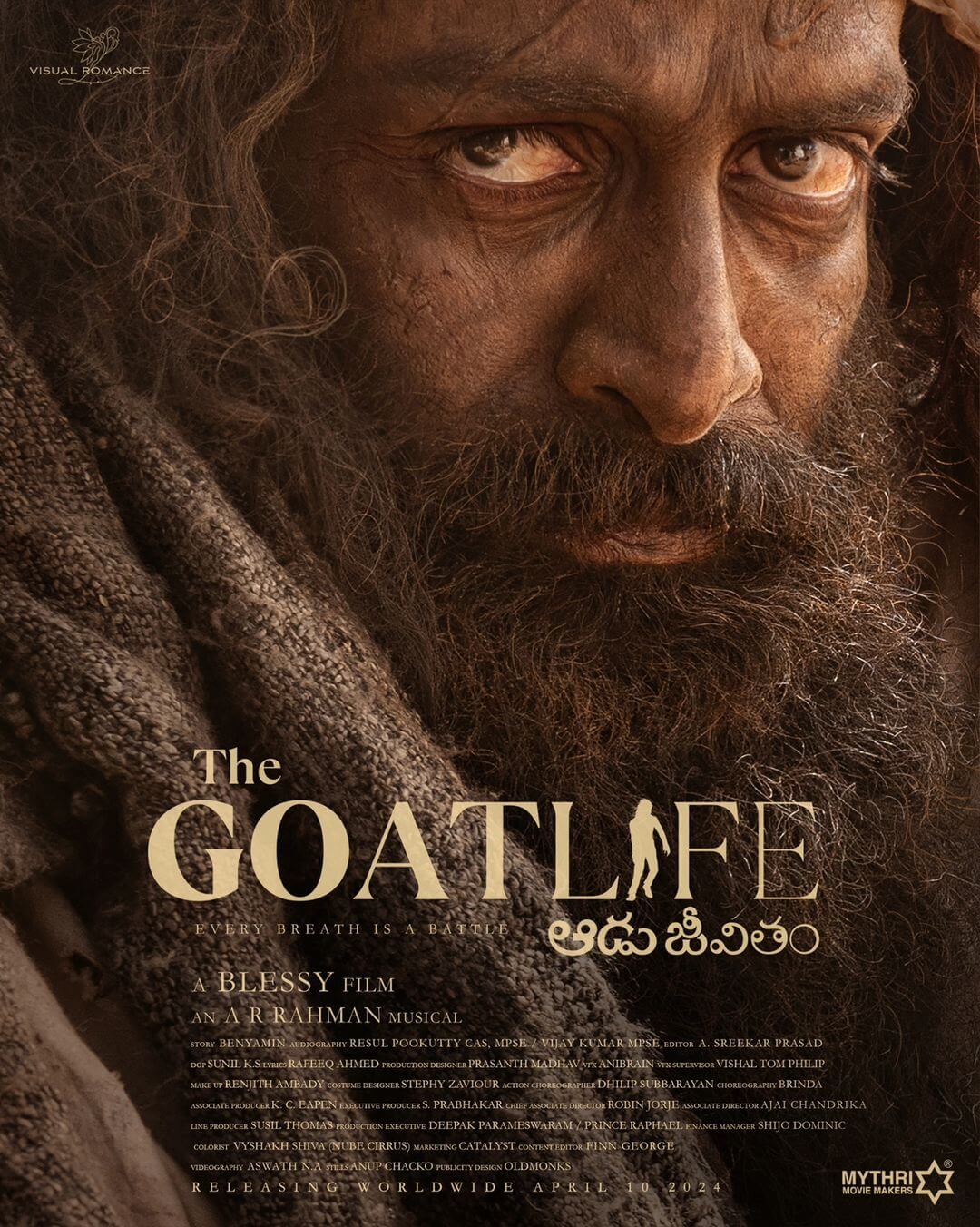On March 28th, Blessy’s much-anticipated film, Aadujeevitham, or The Goat Life, debuted in cinemas amidst eager anticipation. Bringing to life Benyamin’s compelling tale set in the heart of Kerala, the film embarked on a captivating journey, narrating the unforgettable saga of Najeeb, a man swept up in the twists and turns of destiny.
On March 28th, Blessy’s much-anticipated film, Aadujeevitham, or The Goat Life, debuted in cinemas amidst eager anticipation.
In this cinematic interpretation, Najeeb’s challenging journey unfolds against the allure of distant dreams, only to be ensnared in the sinister clutches of modern-day enslavement in the heart of the Middle East. Blessy’s directorial prowess, intertwined with Benyamin’s poignant prose, renders a tapestry of emotions, seamlessly weaving through the fabric of hope, despair, and ultimately, redemption.
As the curtains rise and the reels unfurl, with a narrative steeped in the authenticity of real-life events, Aadujeevitham transcends the confines of mere storytelling, beckoning audiences into the visceral realm of Najeeb’s tumultuous journey. Each frame pulsates with raw emotion, depicting the resilience of the human spirit amidst the harshest of adversities.
The audience is beckoned into a realm where every heartbeat echoes the yearning for freedom and every breath is a testament to the unyielding quest for dignity. In Najeeb’s arduous pilgrimage, viewers are not merely spectators but companions, traversing the treacherous terrain of his tribulations, forging an unbreakable bond with his unwavering resolve.
‘Lives we have not lived are all myths for us’ -Benyamin
In this era of cinematic escapades, Aadujeevitham emerges as a beacon of authenticity, a poignant reminder of the untold stories that often lurk in the shadows of society. Through Blessy’s masterful direction and the ensemble cast’s poignant portrayal, the silver screen transforms into a mirror, reflecting the resilience, fortitude, and undying spirit of Najeeb and countless others like him.
As the film unfolds, it delicately reveals the trials Najeeb endures in the village, amidst goats and camels. With each passing moment, Blessy masterfully captures the crescendo of hardships, evoking a visceral sense of empathy and anguish in the audience’s hearts.
Starting as a fresh-faced and sturdy traveler in Saudi Arabia, Najeeb goes through a drastic change, turning into a shadow of his former self. With his once-smooth face now covered in tangled locks and a scruffy beard, and his body appearing thin and frail, Najeeb’s transformation is striking. Prithviraj Sukumaran, the actor who plays Najeeb, also went through a big change, losing a lot of weight to get into character.
Prithviraj’s compelling portrayal vividly resurrects the harrowing ordeal that Najeeb endured, inviting audiences to ponder the unfathomable depths of human resilience. Indeed, one can’t help but marvel at the sheer tenacity required to endure the unimaginable trials that Najeeb confronted over the years, a testament to the indomitable spirit that lies within us all.
Navigating Najeeb’s journey and Sainu’s plight in Aadujeevitham
Spanning three hours, Aadujeevitham unfolds gradually, offering ample insights into the protagonist’s backstory and his journey to the vast deserts of Masara, Saudi Arabia. Stranded amidst towering dunes, with only goats and camels for company, Najeeb finds himself ensnared in a desolate village, subjected to brutal torment as a slave.
Spanning three hours, Aadujeevitham unfolds gradually, offering ample insights into the protagonist’s backstory and his journey to the vast deserts of Masara, Saudi Arabia.
For viewers watching the film after reading the book, it might feel like certain nuances and emotional depths may have been lost in the translation. Sainu, Najeeb’s pregnant wife, played by actress Amala Paul, only appears in two flashback scenes, which hardly give us a glimpse into her character and her bond with Najeeb. Whether you’ve read the book or not, you might feel let down by Blessy’s decision to keep Najeeb’s family story so brief. Benyamin’s original story, found in his renowned novel, The Goat Days, stretches across 43 chapters, presenting a challenge to condense into a three-hour film.
It’s a tale of resilience and vulnerability, showcasing a man whose life takes an unforeseen twist. Questions arise about Sainu’s fate. How does she cope with the turmoil of not knowing her husband’s whereabouts or if he’s even alive? As audiences watch the film, they’ll inevitably ponder Sainu’s plight, experiencing her journey vicariously through Najeeb as the story unfolds.
The resilience and glimmers of hope amidst despair
Even in the depths of suffering in Aadujeevitham, there are glimpses of hope and gentle beauty, seeing Najeeb finding bits and pieces of peace and joy. In the scene where Najeeb, worn and weary, finds a moment of solace after he feels like he can survive through escape, he takes a quiet bath, a fleeting escape from hardship, a fragile oasis of peace amidst the turmoil. It’s a simple yet powerful scene, a beacon of hope amidst the darkness, reminding us of the resilience of the human spirit.
While Aadujeevitham may not delve as deeply into the torment inflicted upon Najeeb by his oppressors as the novel does, it skillfully utilises the few instances shown to portray the depth of his suffering in the desert. Here, even the basic right to bathe or cleanse oneself is a luxury, with water being a precious commodity purchased at exorbitant prices. Each lesson in this harsh new world is learned through brutal assaults from his bosses, ranging from lashings to the traumatic incident of a shotgun blast shattering his leg.
Even in the depths of suffering in Aadujeevitham, there are glimpses of hope and gentle beauty, seeing Najeeb finding bits and pieces of peace and joy.
Initially regarded as an outsider by the goats, Najeeb gradually earns their empathy as they witness his plight, showcasing animals’ ability to grasp emotions often overlooked by humans. In a poignant scene, after Najeeb’s injury and desperate plea to Allah, a goat approaches him, offering solace with a gentle presence and a resounding bleat that draws others to surround him, shielding him from further harm.
Amidst the relentless torture and failed escape attempts, a beacon of hope emerges in the form of Ibrahim Qadri, portrayed by Hollywood actor Jimmy Jean Louis. With Ibrahim’s arrival, Aadujeevitham gains momentum, revealing not only Najeeb’s journey but also the shared struggle of Hakim and Ibrahim to return to civilisation or find a haven they can call home.
Depicting Qadri as a symbol of Prophet Moses, the film, like the novel, underscores the presence of a guiding force amidst their trials. Ultimately, it is Najeeb who crosses the desert sea, symbolising triumph over adversity and the resilience of the human spirit.
Ultimately, it is Najeeb who crosses the desert sea, symbolising triumph over adversity and the resilience of the human spirit.
As the credits roll and the echoes of Najeeb’s journey reverberate within the confines of the theater, one can only fathom the boundless courage and fortitude that Najeeb must have summoned to navigate the unforgiving landscape of his tribulations for years on end. There Aadujeevitham stands not only as a cinematic marvel but a testament to the enduring power of hope amidst the darkest of nights. In this epic saga of survival, the goat life transcends its literal connotations, evolving into a metaphor for the resilience of the human soul, forever etched in the annals of cinematic brilliance.
Every frame in the heart-wrenching tale of Aadujeevitham, serves as a poignant reminder of the resilience and fragility of the human experience. Beyond the trials endured by Najeeb lies a universal narrative of hope and perseverance, echoing the sentiments of countless individuals who confront adversity with unwavering resolve. As the film draws to a close, it leaves an indelible mark on the hearts of viewers, inspiring reflection on the triumph of the human spirit against insurmountable odds.
